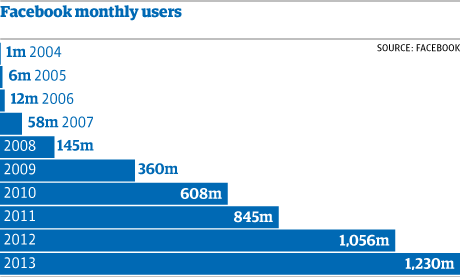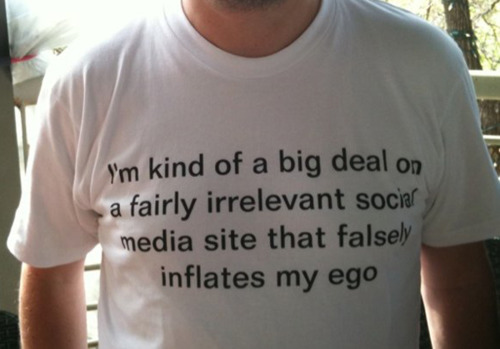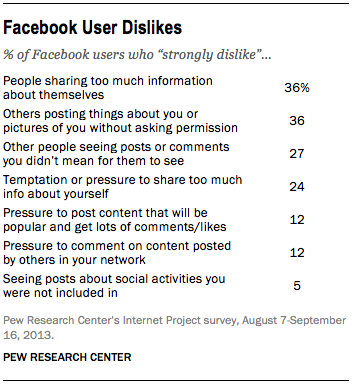As of the end of 2013, Facebook had about 1.23 billion active users per month worldwide, according to this article. Its growth has been substantial since its creation in 2004, and is only expected to continue to surge in popularity. Almost everyone uses Facebook. In fact, half of Internet users who don’t use Facebook live with someone who does.
 Though Facebook was originally created for people to reconnect with their friends from school, it has now become a platform for socializing and has extended to use by people as young as elementary school students, whether is it to play games or to interact with others. In a poll taken in early 2012, Facebook was the most used social network, dominating at 56% and easily overwhelming other social networks.
Though Facebook was originally created for people to reconnect with their friends from school, it has now become a platform for socializing and has extended to use by people as young as elementary school students, whether is it to play games or to interact with others. In a poll taken in early 2012, Facebook was the most used social network, dominating at 56% and easily overwhelming other social networks.
Facebook gives users the power to post content for others to see and “like”. Recently, however, I’ve noticed that many of my friends have begun to covet their “likes”. For  some reason, the number of “likes” that someone receives on a status or picture has become a determining factor for someone’s popularity. A higher number of “likes” indicates that that person has more friends, or that they are better-liked than their peers.
some reason, the number of “likes” that someone receives on a status or picture has become a determining factor for someone’s popularity. A higher number of “likes” indicates that that person has more friends, or that they are better-liked than their peers.

A lot of people also overshare information, posting mundane things and expecting people to respond to them. In fact, oversharing is one of the things that Facebook users dislike the most about other users. There is constantly a request for a “dislike” button, which doesn’t exist for obvious reasons.
I have a friend who uses Instagram and is obsessed with the number of “likes” she gets per picture. Her exact words to me one day were, “I posted this picture 5 minutes ago and I only have 2 likes! Should I delete it?” I think this way of thinking is ridiculous, but it seems to be a common thought-process. I wonder what this trend might suggest about people these days and whether it is a positive thing that ego is boosted based on “likes”, which are essentially meaningless in the real world.

I think that this is so fascinating, particularly because everybody’s reason for awarding “likes” or “favorites” is different. For me personally, it’s a combination of a number of factors, including how amusing the post is, how relevant it is to me, and how well I know the person. I wouldn’t say something has to have me in stitches rolling on the floor laughing to receive a “like,” but I don’t hand them out like free candy either. Some may enjoy a post but not “like” it (for a number of reasons), while others go through pressing “like” for anything that they don’t vehemently disagree with. What do these “likes” even function as anyway? They’re not like “shares,” which signify that you want to spread the word. It’s not like having a certain number of “likes” gets you a spot in some Facebook Hall of Fame. I think of them as a quick head nod of approval for the poster and nothing more.
I, too, have a friend who I have dubbed a “like whore.” She draws so much self-esteem from positive social media feedback that she has threatened to delete unpopular posts. She also impatiently checks instagram, hoping that her pictures will cross the oh-so important threshold of 11 likes, which means the difference between having a list of the users who have favorited the photo versus just “11 likes.” Apparently this is a big deal.
If we look at it on a different level, we’re literally counting the number of people who clicked a certain place on a certain screen or tapped their finger twice on a photo that they likely looked at for all of two seconds, if that. It’s funny — and a little bit sad — that we’re using this to determine our own self-worth. It’s not about whether your posts prompt discussion or call people to action, but whether or not they’re willing to click a button.